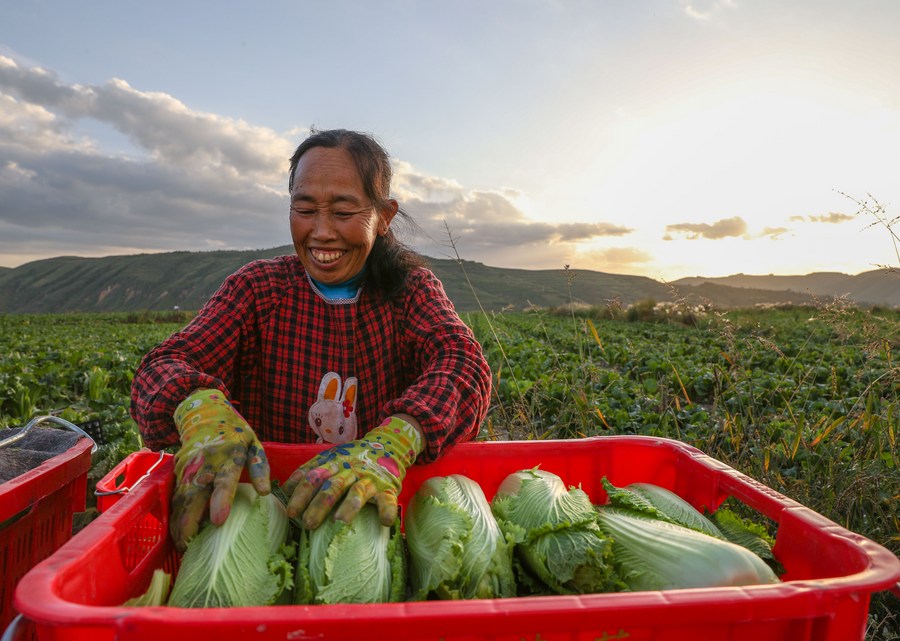Rural women in revolutionary base fight poverty

A farmer harvests Chinese cabbages at a vegetable planting base in Gaoyuan Village of Xiji County, northwest China's Ningxia Hui Autonomous Region, Sept. 7, 2020. (Xinhua/Yang Zhisen)
YINCHUAN, March 17 (Xinhua) -- Nestled in the foothills of Liupan Mountain, Xiji County was among the very last in northwest China's Ningxia Hui Autonomous Region to get rid of penury, with local women playing a major role in the rural backwater's battle against poverty.
The county, with a population of nearly half a million, was a revolutionary base of the Communist Party of China (CPC), where the first and second front armies of the Red Army joined forces in October 1936, marking the final victory of the "Long March".
However, Xiji suffered due to poor public infrastructure, and the majority of its men preferred to migrate to big cities in search of work. The rural women left behind at home began to take part in local poverty alleviation efforts and became a driving force of the county's endeavor toward prosperity.
The family of Luo Aiping, a 43-year-old resident in Xiji's Jiqiang Township, used to eke out a living through the earnings of her husband, a decoration worker.
In 2019, the town established a soft drink factory, which turns local specialty like the goji berry and sea-buckthorn into juice, and Luo joined the factory as a worker in charge of packing finished products.
It is now Luo's fourth year in the factory. She can earn about 4,000 yuan (630 U.S. dollars) a month. There are about 110 workers in the factory. Most of them were housewives from surrounding villages and towns.
Around half of the workers' families were earlier classified as poverty-stricken households, but they have all risen out of destitution through diligence and hard work. "The factory has helped us live a better-off life," Luo said.
In 2020, Xiji was removed from the poverty list, becoming Ningxia's last impoverished county managing to vanquish absolute poverty, thanks to China's poverty alleviation campaign. Today, the per capita annual income of the county stands at more than 12,000 yuan.
Rural women like Luo are becoming Xiji's reliable labor force and they continue to contribute to the county's stable and sound development.
Xinglong Township in Xiji County has a shopping street known by locals as "street of Poyi." "Poyi" means married women in the local dialect. It's named so because most of the shops are run by local married women, particularly women of Hui ethnic group.
Ethnic clothes, delicate carpets, cosmetics, daily necessities and different kinds of halal food can be spotted everywhere on the street.
Zhao Ping, 54, now owns four stores on the street. She used to be a street vendor, struggling for a decent life for nearly three decades.
"The local government has provided us with necessary guidance and subsidies to help us start our own businesses. We can run our business here with ease and expect a rosy future," Zhao said.
At a local potato noodle plant in Xiji County, dozens of female workers were busy making potato noodles, also dubbed as "Red Army Potato Noodle," which are expected to be sold across the country.
In 1936, the Red Army soldiers taught the local Hui people how to make potato noodles. The delicacy is now helping the local people earning a better life.
Photos
Related Stories
- Interview: China's achievements in poverty alleviation significant, says UNDP official
- China to consolidate poverty-elimination achievements
- China pledges to further support employment of people emerging from poverty
- Xi stresses prioritizing development to tackle poverty, imbalance
- Full Text: China's Epic Journey from Poverty to Prosperity
Copyright © 2022 People's Daily Online. All Rights Reserved.










